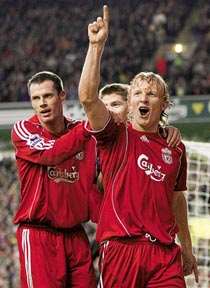10 to watch in 2007
Page 5 of 13 | Single page
By his own admission he lacks the class and clout of other foreign imports but pure hard work has taken the Premiership’s latest Dutch master a long way from his sleepy fishing village
AGE 26
CLUB Liverpool
POSITION Striker
LOWDOWN Has not looked back since being moved from wing to attack
Katwijk is a small fishing village on the west coast of Holland where the wind roars in from the North Sea, causing sandstorms on the beach and across the dunes. There is no railway station, but no need for one: the locals take the 10-kilometre bus journey to the nearest station or, if they get bored of waiting, walk. This is where Dirk Kuyt was born and grew up, where he began his football career, and where he learnt the qualities that look set to secure him hero status at Liverpool.
The 26-year-old is a rarity among Dutch footballers who have tried to succeed abroad: by his own admission, he lacks the technical ability of Dennis Bergkamp, Arjen Robben or Robin van Persie and the belligerence of, say, Edgar Davids or Clarence Seedorf. His strengths are much more English: physically powerful, rarely injured, with a unique desire to succeed.
“I grew up as a normal player, a striker who scores goals but also worked very hard,” Kuyt says. “I was the same as I am now only I practised more then. Even at an early age, my mentality was to work hard. Putting in a lot of effort has always come naturally.”
This is the Katwijk way: Kuyt’s father, Gerrit, was a fisherman who was out at sea for five days a week. The young Kuyt started playing for Katwijk’s amateur side, Quick Boys, when he was six. He soon rose through the youth teams and, when he was 10, his father gave him an ultimatum. “He said I must do the thing I liked the most,” says Kuyt, “and that if I was a fisherman, I wouldn’t be able to play football.” Kuyt chose football though, typically, thinks he would have been a good fisherman too.
That decision has been a blessing for the Liverpool fans, for whom Kuyt has proved one of few bright spots in a disappointing season. The Dutchman seems to have escaped Rafa Benitez’s rotation policy after scoring five goals in his first seven Premiership starts. In that period, he played alongside Craig Bellamy, Peter Crouch and on his own with Luis Garcia just behind him. He never complains, often smiles, and tracks back into his own area where he isn’t afraid to tackle hard. His willingness to chase lost causes comes from his experience as a winger at FC Utrecht, a period that also honed his awareness of space. “I play mostly behind the striker and because in England the teams hardly play with man-to-man defences but with zonal defences, it’s great to find the spaces to play in,” he beams. “I think my kind of play suits the English game really well.”

Tottenham coach Martin Jol calls him “a 20-20 player”, referring to his ability to score 20 goals and provide 20 assists a season. Benitez, meanwhile, has had to ask Kuyt to tone things down in training. “From the first day he was doing technical tests, I said to him, ‘Hey, you don’t need to run so much’,” the Spaniard says. “But he has always been a player with great stamina and he likes to work hard. He can play as a winger or a central striker. One of my former players even said that if I played him at full-back, he would still be one of my best players.”
Kuyt knows that his mentality gives him an edge over other players, and ever since he left Quick Boys and signed for Utrecht at 17, he has battled to prove himself. “It was my dream to be a professional footballer, though I was still very surprised when Utrecht moved for me.”
The teenager had not yet passed his driving test and used to get a lift into training at Utrecht with Alfons Groenendijk, briefly a Manchester City midfielder but also a Dutch league, cup and UEFA Cup winner with Ajax, and now assistant coach at the Amsterdam club. “Alfons used to tell me what it meant to be a professional footballer, and from that moment, I focused on improving myself in every area.”
Kuyt averaged eight goals a season as a winger at Utrecht, until his breakthrough in 2002-03. New coach Foeke Booy moved him up front and he responded with 20 goals in 34 matches. Kuyt also scored and was Man of the Match in that season’s Dutch Cup Final, a 4-1 win over Feyenoord.
A move to the beaten finalists followed, where he continued an incredible run of form and fitness that made the rest of Europe sit up and take notice. From March 2001 to April 2006, he played in 179 consecutive league matches. In peak physical condition, the boy from Katwijk was enjoying his new role. In his first term at Feyenoord, he scored 20 goals in 34 games. The following season it was 29 in 34. He made it four successive seasons topping 20 goals by notching 22 last season, when he was also club captain. To put that in perspective, the last Liverpool player to score 20 league goals in one season was Robbie Fowler in 1995-96.
“At all the clubs I played for, there was always the question, ‘Is he going make it?’ because I don’t have the talent of players like Thierry Henry or Robin van Persie,” he says. “But with a good mentality on and off the pitch – and especially on the training ground – I became better and better. At Utrecht and Feyenoord they still like me. The biggest compliment after I left both clubs was when someone said: ‘Don’t look for another Dirk Kuyt because there isn’t another player like him.’”
AGE 26
CLUB Liverpool
POSITION Striker
LOWDOWN Has not looked back since being moved from wing to attack
Katwijk is a small fishing village on the west coast of Holland where the wind roars in from the North Sea, causing sandstorms on the beach and across the dunes. There is no railway station, but no need for one: the locals take the 10-kilometre bus journey to the nearest station or, if they get bored of waiting, walk. This is where Dirk Kuyt was born and grew up, where he began his football career, and where he learnt the qualities that look set to secure him hero status at Liverpool.
The 26-year-old is a rarity among Dutch footballers who have tried to succeed abroad: by his own admission, he lacks the technical ability of Dennis Bergkamp, Arjen Robben or Robin van Persie and the belligerence of, say, Edgar Davids or Clarence Seedorf. His strengths are much more English: physically powerful, rarely injured, with a unique desire to succeed.
“I grew up as a normal player, a striker who scores goals but also worked very hard,” Kuyt says. “I was the same as I am now only I practised more then. Even at an early age, my mentality was to work hard. Putting in a lot of effort has always come naturally.”
This is the Katwijk way: Kuyt’s father, Gerrit, was a fisherman who was out at sea for five days a week. The young Kuyt started playing for Katwijk’s amateur side, Quick Boys, when he was six. He soon rose through the youth teams and, when he was 10, his father gave him an ultimatum. “He said I must do the thing I liked the most,” says Kuyt, “and that if I was a fisherman, I wouldn’t be able to play football.” Kuyt chose football though, typically, thinks he would have been a good fisherman too.
That decision has been a blessing for the Liverpool fans, for whom Kuyt has proved one of few bright spots in a disappointing season. The Dutchman seems to have escaped Rafa Benitez’s rotation policy after scoring five goals in his first seven Premiership starts. In that period, he played alongside Craig Bellamy, Peter Crouch and on his own with Luis Garcia just behind him. He never complains, often smiles, and tracks back into his own area where he isn’t afraid to tackle hard. His willingness to chase lost causes comes from his experience as a winger at FC Utrecht, a period that also honed his awareness of space. “I play mostly behind the striker and because in England the teams hardly play with man-to-man defences but with zonal defences, it’s great to find the spaces to play in,” he beams. “I think my kind of play suits the English game really well.”

Tottenham coach Martin Jol calls him “a 20-20 player”, referring to his ability to score 20 goals and provide 20 assists a season. Benitez, meanwhile, has had to ask Kuyt to tone things down in training. “From the first day he was doing technical tests, I said to him, ‘Hey, you don’t need to run so much’,” the Spaniard says. “But he has always been a player with great stamina and he likes to work hard. He can play as a winger or a central striker. One of my former players even said that if I played him at full-back, he would still be one of my best players.”
Kuyt knows that his mentality gives him an edge over other players, and ever since he left Quick Boys and signed for Utrecht at 17, he has battled to prove himself. “It was my dream to be a professional footballer, though I was still very surprised when Utrecht moved for me.”
The teenager had not yet passed his driving test and used to get a lift into training at Utrecht with Alfons Groenendijk, briefly a Manchester City midfielder but also a Dutch league, cup and UEFA Cup winner with Ajax, and now assistant coach at the Amsterdam club. “Alfons used to tell me what it meant to be a professional footballer, and from that moment, I focused on improving myself in every area.”
Kuyt averaged eight goals a season as a winger at Utrecht, until his breakthrough in 2002-03. New coach Foeke Booy moved him up front and he responded with 20 goals in 34 matches. Kuyt also scored and was Man of the Match in that season’s Dutch Cup Final, a 4-1 win over Feyenoord.
A move to the beaten finalists followed, where he continued an incredible run of form and fitness that made the rest of Europe sit up and take notice. From March 2001 to April 2006, he played in 179 consecutive league matches. In peak physical condition, the boy from Katwijk was enjoying his new role. In his first term at Feyenoord, he scored 20 goals in 34 games. The following season it was 29 in 34. He made it four successive seasons topping 20 goals by notching 22 last season, when he was also club captain. To put that in perspective, the last Liverpool player to score 20 league goals in one season was Robbie Fowler in 1995-96.
“At all the clubs I played for, there was always the question, ‘Is he going make it?’ because I don’t have the talent of players like Thierry Henry or Robin van Persie,” he says. “But with a good mentality on and off the pitch – and especially on the training ground – I became better and better. At Utrecht and Feyenoord they still like me. The biggest compliment after I left both clubs was when someone said: ‘Don’t look for another Dirk Kuyt because there isn’t another player like him.’”
Related Articles

PUMA reveals new 'Stun Pack'

PUMA Future 18.1 up close













